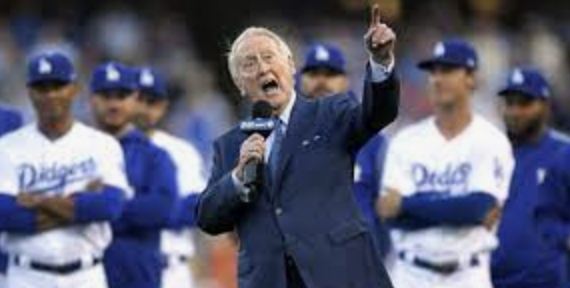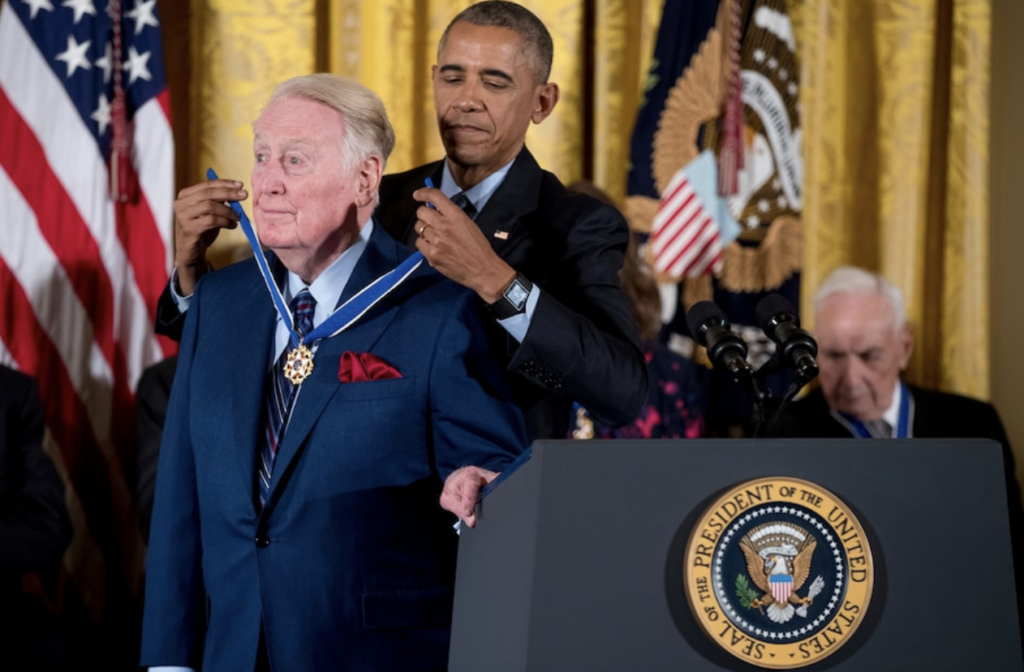“For all the hard times, when you can say ‘why me’?… I have to remember the great moments in my life…and say why me?, too”.
Vin Scully buried two wives, on of whom took her own life.
He buried a son who died in a helicopter crash.
He never complained, though, and when he died Tuesday at age 94, it’s difficult to imagine anyone with a heart not mourning his passing.
Don’t call it a tragedy. He lived a long and fulfilling life, one that was hardly cut short in any way. He is without question the greatest sports broadcaster in American history, and with the exception of a very short stint on radio in Washington, D.C., after college, he held one job for his entire life.
He joined the broadcast team for the Brooklyn Dodgers in 1950, became the lead guy in 1953 and moved to Los Angeles with the team in 1958. For the next 59 seasons, he was the voice of baseball in Los Angeles.
People used to marvel that Connie Mack managed the Philadelphia Athletics for 50 years, but Scully turned in 67 years in a job every bit as demanding. Mack never had to worry about job security because he owned the team. Scully didn’t have to worry because he was completely beloved by Dodger fans.
There have been many broadcasters remembered fondly by baseball fans — Ernie Harwell in Detroit, Jack Brickhouse in Chicago, Bob Miller in Baltimore and San Francisco, just to name a few — but you will never hear anyone say their broadcaster was as good or better than Scully.

People cite his call of Sandy Koufax’s perfect game or Kirk Gibson’s home run as his greatest moments, but I think Scully’s most memorable call came when Henry Aaron hot his record-breaking 715th home run against the Dodgers.
“What a marvelous moment for baseball. What a marvelous moment for Atlanta and the state of Georgia. What a marvelous moment for the country and the world. A Black man is getting a standing ovation in the Deep South for breaking the record of an all-time baseball idol, and it is a great moment for all of us.”
It may be difficult for younger people to comprehend, but much of America was still deeply racist in 1974 and Aaron had received all sorts of hate mail and death threats as he approached Babe Ruth’s career home run record.
For Southern California, Scully was the voice of summer.
If you walked through Dodger Stadium during a game, countless fans would be watching the game but also listening to Scully calling the game on their transistor radios. Eastern fans would ridicule the Los Angeles crowd for leaving games early, but nearly all the cars leaving the parking lot had Scully on the radio telling them what was happening.
He did other sports in the offseason in the middle of his career, mostly golf and pro football, but it is baseball for which he will be remembered.
He was so good for so long. I was less than a year old when Scully joined the Dodger broadcast team. I have been a fan for more than 65 years, and I never heard anyone who was even close to Scully in his excellence.
Some of the tributes have gone beyond sports and compared him to other giants in the broadcasting world. I have a hard time disagreeing with people who say the only name who really belongs at the top of the list with Scully is Walter Cronkite.
It’s an apt opinion. The two men were similar in that they presented things in a straightforward fashion and you never heard them rooting for one side of the other. Scully promised when he took the job in 1950 that he would never be a homer, and he never was.
Another thing he never did was call the people who followed the Dodgers “fans.” He said “fans” was an insulting term, that it was short for “fanatics.”
He called his listeners “friends,” and his final sign-off was a man saying goodbye to the people he loved.
“You and I have been friends for a long time. But I know in my heart that I’ve always needed you more than you’ve ever needed me.. God give you for every storm, a rainbow. For every tear, a smile. For every care, a promise, and a blessing in each trial. For every problem life sends, a faithful friend to share.”
The Dodgers are one of only three baseball teams whose stadium isn’t named after a corporate sponsor or a previous owner.
They should take this opportunity to honor Scully in the best way possible.
Vin Scully Stadium at Chavez Ravine.
If you’re interested, here’s a nice speech from the night the Dodgers said farewell.

